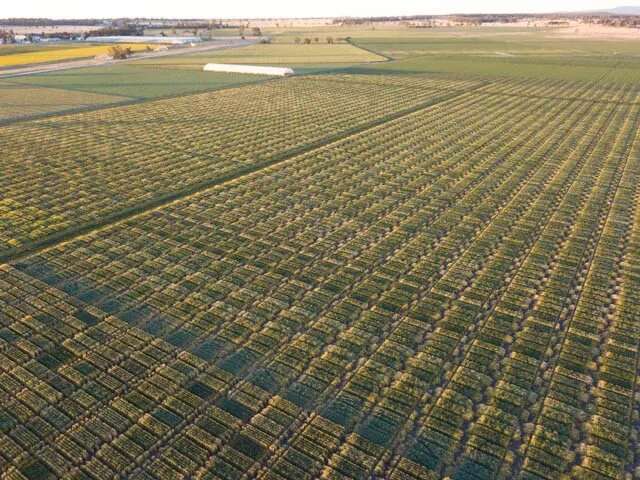More resilient Aussie wheat needed as climate change heats up

University of Sydney researchers tested wheat in heat and carbon-intense conditions that replicate future climate change and found that many common varieties produce fewer grains—a wake up call for growers nationwide.
Some of the most popular wheat varieties in Australia cannot withstand our warming world, new University of Sydney research finds. Sensitive heat-stressed varieties produce significantly lower yields, suggesting further careful plant breeding and selection is urgently needed.
Researchers at the University of Sydney Plant Breeding Institute tested 23 varieties of Australian wheat at an atmospheric CO2 level of 800 parts per million—over double our current global average concentration—and at a temperature of 35°C.
They found elevated CO2 led to higher leaf temperatures by closing the wheat’s stomata—holes used to transpire (or ‘sweat’). This then reduced the viability of the wheat’s pollen, resulting in reduced grain yields.
“At below 40% pollen viability, for example, grain kernels of heat sensitive wheat varieties may be up to half empty or pinched (shriveled or shrunk),” said lead researcher, Professor Daniel Tan, who labeled the relationship between high leaf temperatures and fewer viable pollen “significant.”

The findings under the higher temperature of 35°C were similar—with and without elevated CO2.
Common wheat varieties tested include Suntop—one of the most widely adapted wheat varieties on Australia’s east coast—and Mace and Scepter in Western and South Australia.
The Australian varieties found to be heat intolerant included Phantom, Emu Rock, Cobra and Coolah. Flanker, Lancer, Mustang, Suntime, Cutlass, Mace and Condo, by contrast, coped better with high temperatures.
“The hardy varieties are now candidates for genetic selection,” said Professor Tan, whose results have been published in the Journal of Agronomy and Crop Science.
Developing climate-resilient wheat varieties
Anowarul I. Bokshi et al, Physiological traits for evaluating heat‐tolerance of Australian spring wheat cultivars at elevated CO 2, Journal of Agronomy and Crop Science (2022). DOI: 10.1111/jac.12584
Citation:
More resilient Aussie wheat needed as climate change heats up (2022, February 28)
retrieved 28 February 2022
from https://phys.org/news/2022-02-resilient-aussie-wheat-climate.html
This document is subject to copyright. Apart from any fair dealing for the purpose of private study or research, no
part may be reproduced without the written permission. The content is provided for information purposes only.
For all the latest Science News Click Here
For the latest news and updates, follow us on Google News.

